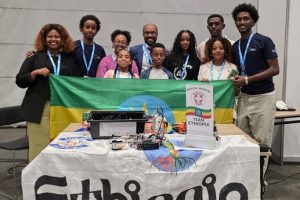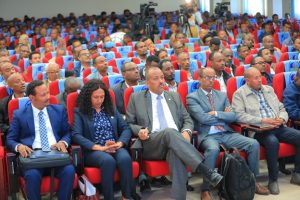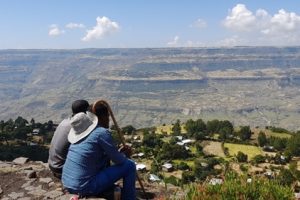
ADDIS ABABA-Though Ethiopia has recorded a historic victory at the Battle of Adwa in March 1896, the extent to which it is known by Africans and Black people across the world appears to be unclear.
Having this in mind, the reporter was looking for black people on the streets of Addis Ababa to ask them whether they have ever heard about the glorious victory and if their answer is on the affirmative, how they managed to get the information. The victory of Adwa will be celebrated on the coming Saturday, March 2, 2019. Ouatachin Kone is from Ivory Coast. He was in Addis for business.
He says that he knows about the decisive historic event. The information he has, however, was not learnt formally. “Because Ivory Cost education system had not incorporated it in its curriculum of history, but I think it should have been,” he remarked yesterday at Hilton International Hotel before he rushed to his next session. Kone says that knowing true history could shape the way we perceive our dignity and values, to handle the days to come.
For him, the past is important because it can tell us how we evolved. It can tell us what decisions worked in particular situations in the past and what did not. “In my view The Battle of Adwa, is the spectacular event in which Ethiopian forces under Emperor Menelik II show unity and resilience in defeating an invading Italian force. It is also one of the most significant turning points in the history of modern Africa,” noted Kone.
According to the Ivorian man, the lesson from Adwa is so great to the whole black people that it has become a source of pride for them. That is why “it should be celebrated worldwide. The event tells how the strong stood against the weak, and the subsequent result inspires people who find themselves overpowered by their opponents.” Ethiopia gave the asset and values of Adwa victory to the whole world, the world should be cognizant to that to preserve it, Kone says.
Historians documented that in the war, there had been underestimations by the invading army to achieve their hidden goal of enslaving the whole black people. But the then brave Ethiopian leaders, warlords and the mass had understood the trick in advance and undone it because the peoples were setting aside all their internal differences and stood together in defiance of the foreign aggression, according to documents.
For Kone, the new blood of Africa and the black people in the world are not well informed about the values of our forefather’s brevity. “The lesson is immense. For one, it tells unity is strength and commitment in dealing own affairs without a third party.” The other black person the reporter met was the Jamaican, Michelle Martin whom the reporter met strolling in the compound of the National Museum.
“I feel proud to be here and consider myself coming to my own roots,” she says. “To me Adwa is a lot because it is the source of pride and resilience. It has let the other side to respect what the Blacks had recorded in the path of history.” With regard to what she knew about Adwa, Martin, who is in mid 40s says, “I passed through the European education system, which does not acknowledge Adwa let alone incorporating it into the system.
I wish I have learnt about it [in schools] earlier.” For Martin, the sad thing is beyond knowing about the history of Adwa. “When we ignore Adwa then, we overlook a crucial cogwheel of black history and an almost indispensable lubricant of the protracted decolonization struggle. The dots should be connected to the due date of the struggle the Black world persisting to actualize.”
“Above all, I am so impressed by the effect that Adwa had manifested in the evolution of the African anti-colonial struggle and the cultural and emotional history of blacks all over the world. Its impact on the black Diaspora as echoed for instance widespread in the African, Caribbean and US literary circles of the post-World War I period which culminated in the rise of Harlem as the cultural medina of the Black World.”
The Jamaican lady says that Adwa did not come out of blue. Ethiopians have paid heavy price for the victory to come true. Despite that the victory happened to be part of the black people’s history. And yet the black posterity is not well aware of it as most of the knowledge the posterity have is acquired in informal ways.
The ideas of the two interviewees from Jamaica and Ivory Coast indicate that there is a critical need of incorporating Adwa in the history books of Africa and freedom loving people of the world. Efforts should be there to dedicate some pages for the glorious event in the African and Black history books.
The Ethiopian Herald, February 27/2019
BY MENGISTEAB TESHOME





